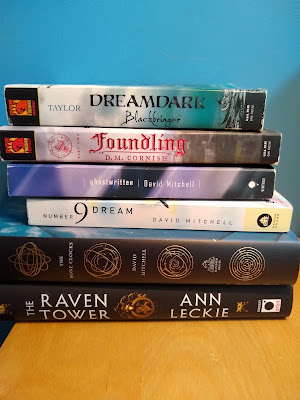I believe in a god of books. This belief rests side by side with my devout atheism, illogical and yet true.
My god of books is a cranky god, with a heart in the right place. They are genderfluid--shifting their appearance between a woman and a man when they come to me. They are always wearing a soft, old favorite cardigan. They are old, hair graying, reading glasses perched on their nose, and eyes that also shift color--sometimes icy blue, sometimes a warm brown, sometimes an indeterminate hazel--depending on their mood and their opinion of me.
Yes, they have opinions of me. Sometimes they judge me harshly. Sometimes they see me with kindness. Sometimes they like to watch me squirm, not able to find anything to read that satisfies what I need from words. Then they will send me a generous burst and the books I most need to get through the day will arrive one after another after another. These are the blessings I receive from my god of books. This past year, it was Deacon King Kong, then Apeirogon, then The Night Watchman, and then Hamnet which arrived in a succession that felt like an intervention, to give my brain a reprieve from all the worry and fear that this world has thrown at us this year. I received them like a life preserver thrown to someone drowning. I can't imagine having functioned through those months without them. Some people read to understand themselves better. I do not. I read to escape myself because I think I understand myself a little too well.
There are days when I would do anything to escape being me. And reading can do that--like a parasite I can latch onto someone else's thoughts and imagine the world looking out of someone else's bony eye sockets, such a relief after being trapped for most hours of most days looking out from my own.
My god of books often does not care if I am uncomfortable. They withhold as often as they gift. I pick up and read the first chapters of one, two, three, four, five books and nothing takes. I put the book down and I am still me. I mutter incantations, I restlessly read book reviews, I keep my ear to the ground for recommendations--messages from my god of books--that I am supposed to follow. My husband has learned to recognize these times: I am squirrely and restless and prone to irritation.
Sometimes re-reading a book will work. I don't know how I would have survived adolescence without my annual re-read of Steinbeck's East of Eden; I read it for the first time when I was about 12 and I am certain that it was a gift from my god of books, a time when they looked at my squirming, prickly, uncomfortable being and put the tome in my hands, saying, "Try this. I think this is the book you need." I wore out two copies of that book.
And sometimes re-reading doesn't cut it. This year I tried to escape into known good books and it rarely worked. The world was too cockeyed and I had the discordant sensation of sitting with my previous self and how I would have read the book before all the crises of the year rained down one after another. I was too envious of my previous self and thus, the known books could not whisk me away. Among those books that were pulled off the shelf with hope and then re-shelved were beautiful works like Hild by Nicola Griffith, Black Swan Green by David Mitchell, The Monsters of Templeton by Lauren Groff and The Welsh Girl by Peter Ho Davies. I felt my god of books watching and tapping their foot. The books didn't fail me; I failed the books.
Sometimes my god of books gives me permission to stop thinking big thoughts, to go relax into a comforting mystery like settling into a warm bath and just feel soothed for a while. Or, with a mischievous twinkle, they'll guide me to a book that makes me laugh out loud. Or send me on an escape to another planet to think about what it would be like to be an augmented human for a while. I am very grateful that my god of books is not a snob.
The latest evidence of this god's existence happened this morning. Yesterday evening I finished listening to the audio book of Ann Patchett's latest novel, The Dutch House, read by Tom Hanks. And then, this morning I found this amazing essay in Harper's written by Patchett about her link to Tom Hanks and what that link ended up gifting her in 2020. I cried when I read the essay, it's that beautiful. And there is simply no way to put down my discovery of the essay to chance: that was my god of books nudging a little something into my hands so I could start the year feeling the magic of existence again, refreshing and refilling my dried up supply of hope.
























